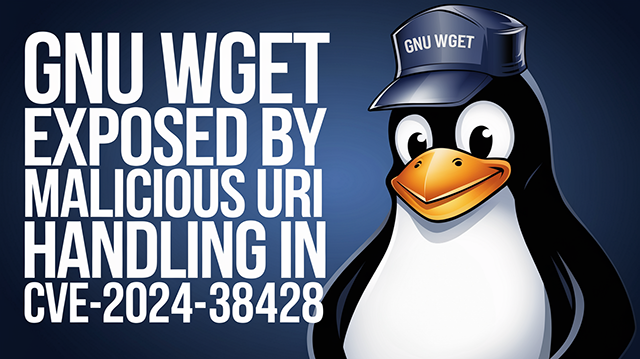GNU Wget Exposed by Malicious URI Handling in CVE-2024-38428

Threat Group: N/A
Threat Type: Software Vulnerability
Exploited Vulnerabilities: CVE-2024-38428
Malware Used: N/A
Threat Score: High (9.1/10) — Critical vulnerability due to potential for sensitive data exposure, phishing, and man-in-the-middle (MiTM) attacks.
Last Threat Observation: June 2, 2024, fix commit pushed; vulnerability classified in August 2024.
Overview
CVE-2024-38428 is a critical vulnerability in GNU Wget (up to version 1.24.5), a widely used tool for downloading content from servers. This vulnerability stems from incorrect parsing of the userinfo section in a URI, particularly when semicolons are present. Misinterpretation of URI components can lead to unintended network connections, exposing systems to phishing, server-side request forgery (SSRF), man-in-the-middle (MiTM) attacks, and potential malware installation.
While no upstream fix has been released yet, several Linux distributions (e.g., Ubuntu, Red Hat, Debian, SUSE) have issued patches.
Key Details
- Affected Versions: All GNU Wget versions up to and including 1.24.5.
- Root Cause: Wget’s URL parsing mechanism incorrectly handles semicolons in the
userinfosegment. - Impact:
- Redirection of DNS queries to attacker-controlled domains.
- Resource restriction bypass, sensitive data exposure, and potential remote code execution.
- Increased susceptibility to phishing and MiTM attacks.
Attack Examples:
- SSRF: Maliciously crafted URIs can redirect requests to unauthorized hosts, allowing attackers to bypass restrictions.
- Phishing: Victims can be tricked into downloading malicious files from seemingly legitimate domains.
- MiTM Attacks: Attackers can proxy communications between the victim and a legitimate server, intercepting sensitive data.
- Data Leakage: Crafted requests may expose sensitive information in error logs or other server responses.
Attack Vectors
- Protocols: The vulnerability primarily affects FTP and FTPS protocols. HTTP and HTTPS are less exploitable due to stricter URI parsing constraints.
- Exploitation Prerequisites:
- The attacker must control the
userinfoportion of a URI. - FTP/FTPS protocols must be used to exploit the flaw effectively.
- The attacker must control the
Exploitation Workflow:
- A crafted URI, such as
ftp://attackerhost;@host, tricks Wget into treatingattackerhostas the target host. - The URI initiates unintended network connections, enabling various attack scenarios like phishing or SSRF.
Mitigation and Prevention
- Upgrade GNU Wget:
- Apply patches provided by Linux distributions (Red Hat, Ubuntu, Debian, SUSE).
- Monitor for updates from the GNU project.
- For Red Hat: Use
yum update wget. - For Ubuntu/Debian: Use
sudo apt update && sudo apt upgrade wget. - For SUSE: Use
zypper update wget.
- For Red Hat: Use
- Temporary Workarounds:
- Restrict semicolons in the
userinfosegment of URIs. - Avoid using user-controlled data in
userinfo.
- Restrict semicolons in the
- Network Monitoring:
- Implement monitoring to detect suspicious outbound connections initiated by Wget.
- User Awareness:
- Train users to recognize phishing attempts and the dangers of accessing untrusted URIs.
- Input Validation:
- Implement strict URI validation to sanitize inputs.
- Restrict FTP Use:
- Limit FTP protocol use, favoring more secure protocols like HTTPS.
Conclusion
CVE-2024-38428 represents a critical vulnerability with wide-ranging consequences, including phishing, SSRF, and MiTM attacks. Immediate action is essential to protect systems by applying patches or implementing recommended mitigations. Organizations must also focus on user education and proactive monitoring to reduce risks.
Sources
- JFrog Blog: CVE-2024-38428 Wget Vulnerability
- National Vulnerability Database (NVD): CVE-2024-38428
- Ubuntu Security: CVE-2024-38428 Details


